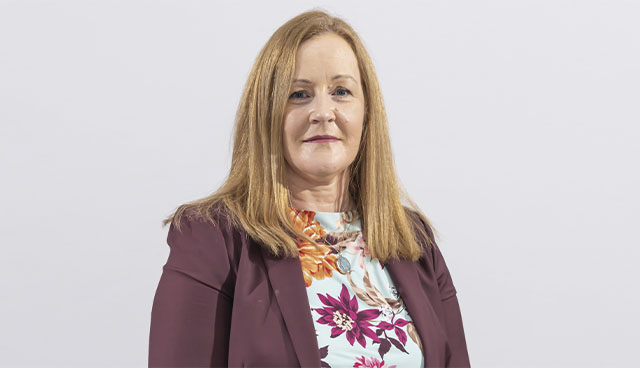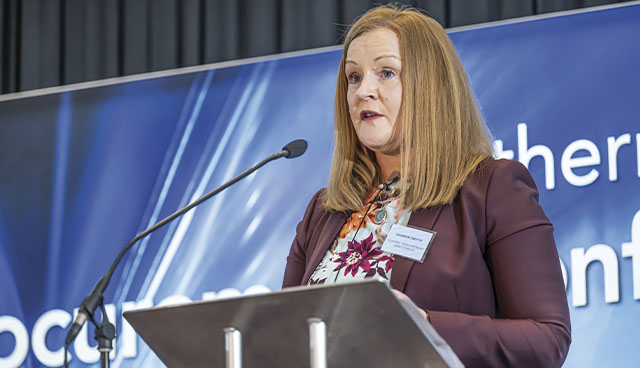Delivering effective public procurement policy

Sharon Smyth, Chief Executive of Construction and Procurement Delivery (CPD) for the Department of Finance, discusses how monitoring is set to play a critical role in procurement reform for a more effective system.
Offering an honest reflection of the effectiveness of public procurement policy in the Northern Ireland in the past two decades, Smyth says that, following a shift in how policy is developed and approved, more focus is now being placed on measurement. Smyth highlighted that since 2020, a number of strategic drivers have required a transformation in public procurement governance structures and policy priorities, meaning a shift of focus away from a process-driven function to a commercial enabler, helping to deliver the Programme for Government commitments.
Included in this shift was a move by the then Finance Minister Conor Murphy MLA to restructure the Procurement Board, replacing permanent secretaries with senior procurement practitioners and appointing representatives from industry, as well as the voluntary, community, and social enterprise sectors to broaden the input on policy development.
In addition to restructuring the Board, the Minister also changed the approach to policy approval, with a requirement for Executive approval helping to ensure the consistency and the application of policies. And, in an important step ordered a review to existing Procurement Guidance Notes (PGN’s) to extract essential procurement policy.
These steps by the Minister were developed to ensure a shift away from procurement policy being dominated by purely economic considerations and instead broadened to include goals such as societal, environmental, and human wellbeing and rights.
“It was recognised that best practice guidance had moved significantly with the development of the UK Government’s Cabinet Office’s playbooks, which have shifted practice away from procedural instruction in favour of a much more commercial approach.”
On how this intention is being achieved, Smyth points to the development of a forward work programme (FWP) in April 2021 with the aim of implementing procurement policy to drive “broader social impacts alongside cost and quality”.
To date, five policies have been agreed by the Executive to meet these priorities since the FWP was developed, including the Scoring Social Value Policy (PPN 01/21) in July 2021 and four further policies in November 2021 of:
• Social and Other Specific Services (PPN 02/21);
• Supply Chain Resilience (PPN 03/21);
• Procurement Control Limits (PPN 04/21); and
• Human Rights (PPN 05/21).
The Procurement Board also agreed two further policies on the construction pipeline and the use of a standard form of contract for construction projects in February 2022 but the absence of an Executive means that these are still awaiting approval.
“From our point of view, the new policies are simpler to navigate and genuinely reflect the Executive priorities and obligations on public procurement bodies,” explains Smyth.
“The review of existing PGNs found that while there was good reason to develop the policies, it was clear that many were outdated and had outlived their useful purpose as there were alternative sources of information of best practice in place.”
Smyth adds: “It was recognised that best practice guidance had moved significantly with the development of the UK Government’s Cabinet Office’s playbooks, which have shifted practice away from procedural instruction in favour of a much more commercial approach.”
The Procurement Board has agreed to consider the application of the playbooks published by the Cabinet Office with the aim of improving commercial focus. The Sourcing and Construction toolkits will not be mandated in Northern Ireland but as Smyth explains, all heads of Centres of Procurement Expertise are working closely to agree common practices were possible.

“We are moving towards a system where ownership of toolkits will rest with procurement practitioners, which will allow the flexibility necessary to ensure that guidance keeps pace with best practice and delivers a more responsive, agile, and innovative procurement environment.
“We also must think about procurement in terms of a complete commercial system so that we consider the skills and competencies of the various actors within the system and ensure the same focus applied in the procurement or tendering stage is matched at the planning, contract management, and the exit stage of the commercial life cycle.”
Measurement
Smyth stresses that demonstrating the effectiveness of the shift in procurement policy requires adequate measurement. Explaining that each new policy note now includes a section on monitoring and reporting, requiring each Centre of Procurement Expertise to provide reports against their performance annually. Smyth says that by monitoring policy, CPD will be able to demonstrate the effectiveness of public procurement by showing:
social value impacts through the policy on scoring social value;
how many contracts have been reserved for the voluntary, community and social enterprise sectors;
case studies to demonstrate supply chain resilience;
volume and value of contracts awarded over £30,000; and
details of the actions taken to address human rights risks.
Smyth suggests the benefits of monitoring include not only being able to demonstrate the work of Centres of Procurement Expertise and the impact procurement policy has on each of these, but also increase transparency in how public money is spent and highlight the commitments for ethical, sustainable, and socially driven procurement practices.
“This new monitoring regime will allow us to form a baseline of performance and effectiveness of public procurement from which to work from,” says Smyth, adding: “We have to show what we do and demonstrate how public procurement can make an impact on broader social themes.
“The new policy notes will reinforce the commitment for ethical, sustainable, and socially driven procurement practices, which should deliver more consistent and transparent outcomes.”
Concluding that a “dramatic shift” has occurred in public procurement in Northern Ireland since 2020, Smyth says that this represents “only the start” of the journey of procurement reform.
“I believe the new public procurement regime, underpinned by the UK’s upcoming Procurement Reform Bill, will provide a more transparent procurement. I am a great believer in the power of data to drive change and with the new monitoring regime in place, I hope that very soon we will be able to competently answer the question of whether public procurement in Northern Ireland is indeed effective.”





